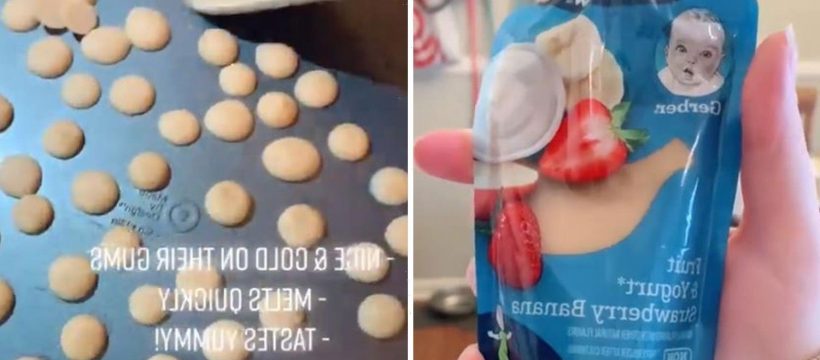A MUM has gone viral after sharing her teething hack online, with an alarming number of parents wanting to try it themselves at home.
But experts warn against the unsafe idea and say it's a potential choking hazard, and urge parents not to try it with their young kids.
The TikTok user uses a yoghurt pouch to create small, frozen drops that her baby can suck on, and says that the cold temperature will help sooth aching gums.
But the size of the drops is what's concerning as they can easily become lodged in your little one's airways – so it's been advised not to try it at home.
According to the Raising Children network in Australia, anything smaller than a D-size battery should be kept well out of reach of young children, Kidspot reports – and similar advice is given here in the UK.
Dr Richard Daniels, NHS Paediatric Registrar and clinical adviser for the paediatric health app Juno Health says "we'd advise not to risk it" and explained the potential harm it could cause.
He told Fabulous: "When babies are teething, parents will try lots of things to help soothe their discomfort. So it's completely understandable that the frozen yoghurt 'hack' looks tempting.
"However, with little ones, it's always best to err on the side of caution. Even if the yoghurt recommended by this mother does melt rapidly, different brands may not melt as fast.
"Given the size of these frozen yoghurt discs – just the right width to create a blockage in the windpipe – we'd advise not to risk it. In general, parents should avoid taking child health advice from social media."
He added that parents should "take care when it comes to keeping small objects out of their reach and ensuring any food they eat doesn't present a choking hazard."
Dr Daniels also offered some more suitable solutions if your baby is feeling some discomfort due to teething.
He said: “If your baby is weaned, chilled yoghurt or other cool foods such as smoothies can help soothe sore gums. Chilled teething rings can also help for all ages.
"Again, if your baby is weaned, giving them little pieces of food, such as apple, carrot or breadstick, to chew on is recommended – although make sure they're cut up very small to avoid choking hazards here too.
"If they are old enough to hold the food themselves, it can be a bit bigger as the child will bite off smaller amounts. It’s vital that you never leave a child unattended when they are eating."
How to stop a child from choking, according to the NHS
Back blows –
- Lay a small child face down on your lap as you would a baby.
- If this isn't possible, support your child in a forward-leaning position and give 5 back blows from behind.
If back blows don't relieve the choking and your baby or child is still conscious, give chest thrusts to infants under 1 year or abdominal thrusts to children over 1 year.
This will create an artificial cough, increasing pressure in the chest and helping to dislodge the object.
Abdominal thrusts –
- Stand or kneel behind your child. Place your arms under the child's arms and around their upper abdomen.
- Clench your fist and place it between the navel and ribs.
- Grasp this hand with your other hand and pull sharply inwards and upwards.
- Repeat up to 5 times.
- Make sure you don't apply pressure to the lower ribcage, as this may cause damage.
If your child is less than a year old:
Back blows –
- Sit down and lay your baby face down along your thighs, supporting their head with your hand.
- Give up to 5 sharp back blows with the heel of 1 hand in the middle of the back between the shoulder blades.
Chest thrusts –
- Lay your baby face up along the length of your thighs.
- Find the breastbone and place 2 fingers in the middle.
- Give 5 sharp chest thrusts (pushes), compressing the chest by about a third.
If a choking child is, or becomes, unconscious, put them on a firm, flat surface, shout for help, call 999 and don't leave your child.
For more information on how to do CPR, or what to do if your child is choking, visit the NHS website.
He continued: "If your baby is in a lot of discomfort and is older than 3 months, the NHS advises that child-friendly paracetamol or ibuprofen can be given. But always read the label carefully before giving any painkillers to children, and speak to a pharmacist or a doctor if you have any questions.
"And, most importantly, make sure you're prepared just in case your child does start to choke. There's fantastic advice from the NHS and other trusted online resources, as well as plenty of baby first aid classes – I'd really recommend taking one to ensure you know exactly what to do should an emergency arise."
Follow Fabulous' Instagram page for the hottest celebrity news, fashion, beauty and real life content @fabulousmag
Meanwhile, paramedic issues urgent choking warning about the dangers of Mini Eggs for kids
Plus the ‘mother’s kiss’ is the simple trick EVERY parent should know & it instantly removes small items from your kid’s nose.
And a man reveals why you should NEVER approach your car if something is tied to the handle – as man claims it’s a criminal distraction tactic.
Source: Read Full Article



